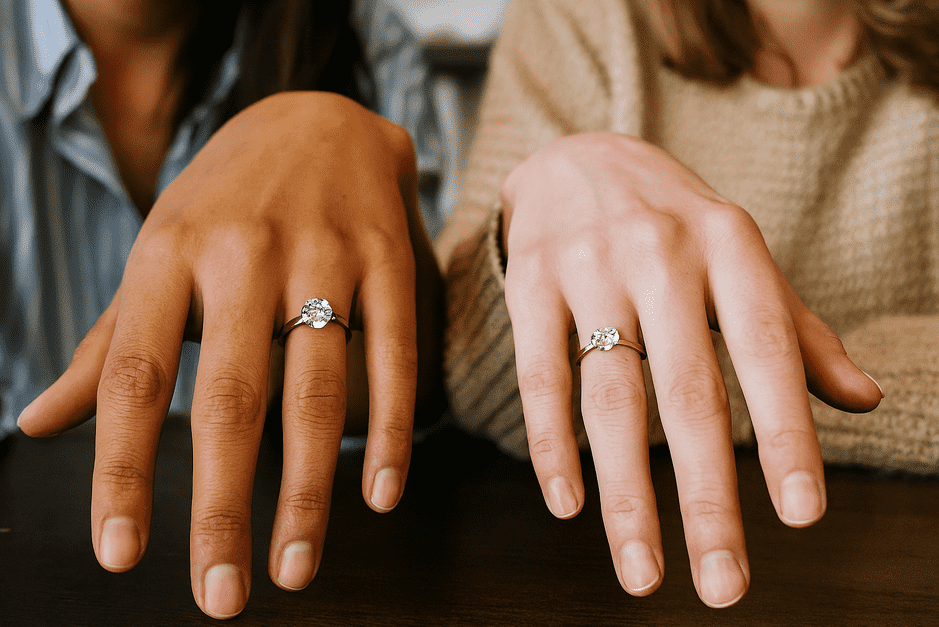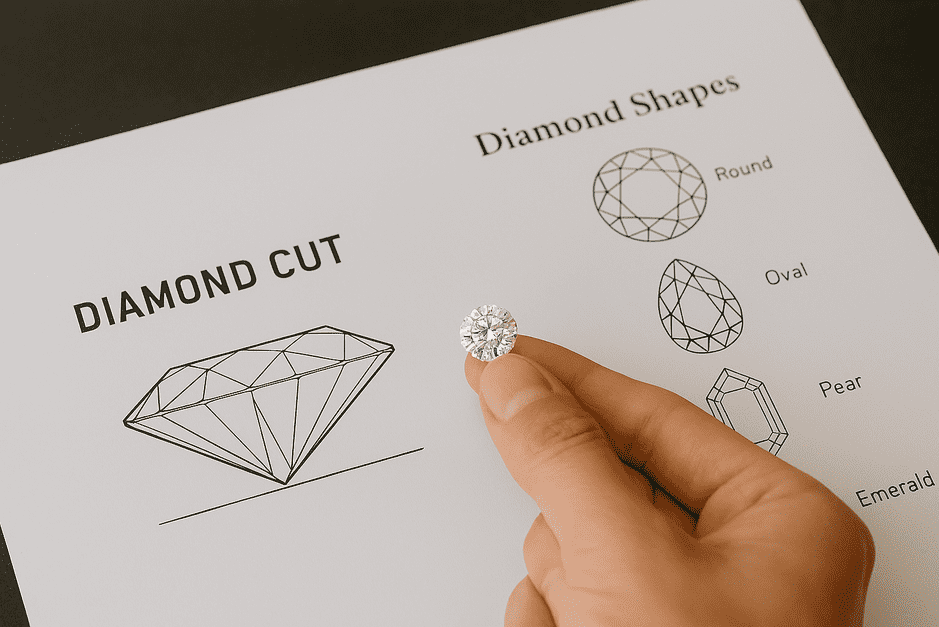Buying a diamond is deeply personal. Yet many buyers fall into what I call “the comparison curse.” The moment a friend shows off their engagement ring, the thought comes: “I want mine to be bigger, clearer, or better.”
The truth is simple: every diamond is unique, just like every buyer’s story. Chasing someone else’s stone often leads to disappointment or overspending. The goal is not to outshine your friend—it’s to find a diamond that matches your taste, budget, and lifestyle.
The Emotional Trap of Comparison
Research shows that 42% of diamond buyers admit comparing their purchase to someone else’s ring. This behavior often drives impulsive decisions and inflated budgets.
As an expert with 40+ years in gemology and the diamond trade, I’ve seen clients regret buying a “status” stone instead of the right one for them.
The key is this: Your diamond should reflect your values, not your neighbor’s.
Case Example
One client came to me after buying a 2-carat diamond just to keep up with her friend. A year later, she traded it for a smaller, better-cut diamond that actually looked brighter and matched her taste.
This is proof that size or “social comparison” is never the full story.
Practical Advice
- Focus on cut and brilliance over size. A well-cut 1.5-carat can outshine a poorly cut 2-carat.
- Set your budget first. Avoid spending just to match someone else’s stone.
- Look for certification. Always buy diamonds with GIA or AGS grading reports.
- Think about wearability. Choose what feels comfortable for daily life, not just for social media photos.
FAQ
Q: Why do people compare their diamonds to others?
A: Because jewelry is emotional and visible. But comparison often leads to overspending.
Q: Can a smaller diamond look better than a larger one?
A: Yes. A well-cut smaller diamond often has more sparkle than a larger but poorly cut one.
Q: What is the smartest factor to prioritize?
A: Cut quality. Research shows cut contributes up to 60% of a diamond’s sparkle.
Q: Should I buy the same diamond shape as my friend?
A: No. Choose a shape that flatters your hand and fits your personal style.
Suggested reading:
How to Budget for an Engagement Ring
Understanding Diamond Quality Factors
This Indian Western jewelry guide offers clear answers on styles, buying, and care. Whether you prefer traditional Indian jewelry or modern Western designs, following these tips ensures your collection stays stylish, safe, and long-lasting.
Welcome to this Indian Western jewelry guide. Here, you’ll explore popular styles, key differences between Indian and Western jewelry, and practical buying tips. This guide helps you choose pieces for daily wear, special occasions, and gifts.
General Jewelry FAQ
How do you choose jewelry for daily wear?
Pick practical pieces such as gold studs, silver hoops, or a thin chain. They work well with everyday outfits and last longer with minimal care.
What should you check before buying jewelry?
Check gold for official hallmarks and silver for 925 purity marks. These details prove quality and help you avoid poor purchases.
How do you care for jewelry at home?
After each use, wipe items with a soft cloth. Store them in pouches to avoid scratches, and keep them away from perfumes and water to preserve shine.
Does jewelry make a good gift?
Yes. Silver bracelets suit birthdays, while gold earrings or bangles are ideal for weddings and anniversaries.
Indian Jewelry FAQ
Popular Indian Jewelry Types
What are the main types of Indian jewelry?
Kundan, Jadau, Temple, Polki, and Meenakari are all popular. Each style has unique appeal and occasions for wear, as explained in this Jewelry FAQ Indian Western.
When should you wear heavy bridal jewelry?
Heavy sets are perfect for weddings, receptions, and major festivals. For smaller events, opt for lighter earrings or slim chains.
Indian Bridal Jewelry
What makes Kundan and Polki bridal jewelry different?
These handcrafted sets combine earrings, necklaces, and bangles, offering intricate detail and uniqueness.
Should you buy a full bridal set or separate pieces?
A full set works best for weddings, while single pieces offer more flexibility for repeated use.
Indian Jewelry Care
How do you care for Kundan and Polki jewelry?
Store in soft-lined cases, avoid water and sprays, and gently wipe with a dry cloth.
Can you clean antique jewelry at home?
No. Antique pieces are delicate and should be cleaned by a professional jeweler.
Do Indian designs work with Western fashion?
Yes. A Polki choker can pair with a gown, and Jhumkas can enhance jeans. Mixing styles shows why this Jewelry FAQ Indian Western is popular.
Western Jewelry FAQ
Western Jewelry Styles
What defines Western jewelry?
Cocktail rings, layered necklaces, minimalist chains, and bold hoops. Western jewelry often follows seasonal trends.
Why is silver popular in Western fashion?
Silver is stylish and affordable, suitable for both formal and casual wear.
Layering Techniques
How should you layer necklaces?
Start with a choker, add a mid-length chain, then finish with a pendant for balance.
Workwear Jewelry
What jewelry works best in an office?
Simple diamond studs, light hoops, or thin gold chains. One statement piece is fine; avoid stacking multiple bold items.
Seasonal Jewelry
Should you follow seasonal jewelry trends?
Yes. Seashell styles fit summer, pearls suit autumn, and heavy cuffs work well in winter.
Buying and Styling Jewelry
Choosing Between Gold and Silver
How do you decide?
Gold flatters warm undertones, silver suits cool tones.
Is costume jewelry worth buying?
Yes, especially for short-term styling or festivals.
Mixing Indian and Western Styles
How should you store mixed jewelry?
Use a box with separate slots for gold, silver, and imitation jewelry to avoid scratches.
Can Indian and Western styles be mixed?
Absolutely. Silver hoops with sarees or gold bangles with evening gowns create a bold fusion look.
Professional Guidelines
What is ideal for office wear?
Stud earrings, fine bracelets, and slim chains keep you elegant and professional.
Jewelry Care and Storage
How do you clean silver jewelry?
Use a silver cleaning cloth or mild soap water, rinse, and dry completely.
How should you maintain gold jewelry?
Store in velvet-lined boxes and avoid perfumes or sprays.
How should jewelry be carried while traveling?
Use a travel box with separate slots to prevent tangling and damage.
This Indian Western jewelry guide offers clear answers on styles, buying, and care. Whether you prefer traditional Indian jewelry or modern Western designs, following these tips ensures your collection stays stylish, safe, and long-lasting.



